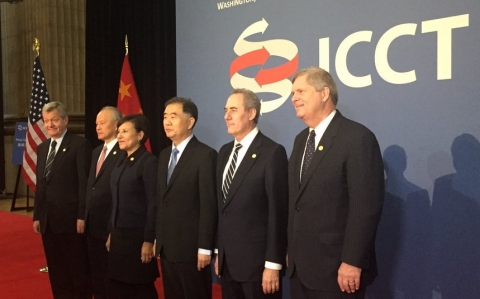Dec012016
Posted at 11:10 AM
As key trading partners and the world’s two largest economies, the United States and China share a mutual interest in promoting economic prosperity, both nationally and globally. Last week, the 27th session of the U.S.-China Joint Commission on Commerce and Trade (JCCT) in Washington D.C. provided both countries a forum for a cooperative and constructive bilateral engagement.
U.S. Secretary of Commerce Penny Pritzker and U.S. Trade Representative Michael Froman led the U.S. delegation in discussions with Vice Premier Wang Yang and other Chinese government officials. U.S. Secretary of Agriculture Tom Vilsack and U.S. Ambassador to China Max Baucus also participated in this year’s JCCT, the last of the Obama Administration.
The delegations focused on ensuring the full implementation of past JCCT commitments and also announced key outcomes in the areas of intellectual property protection, pharmaceutical and medical devices, and information security policies. The two sides also announced future dialogues and collaborative and capacity building efforts.
The JCCT has transformed dramatically during Secretary Pritzker’s tenure. In 2013, during a tea break at the 2013 JCCT in Beijing, Secretary Pritzker, Vice Premier Wang, and Ambassador Froman had the radical idea of “reimagining” how the JCCT works. In addition to government-to-government meetings, the JCCT now includes opportunities for the American and Chinese delegations to hear directly from both countries’ business communities about opportunities to strengthen the U.S.-China economic relationship. Additionally, during the dialogue, both countries’ representatives participate in events that foster greater communication and promote growth opportunities between U.S. and Chinese business leaders.
Here are key outcomes of the 2016 JCCT:
Implementation
- The two parties agree on the importance past JCCT outcomes to secure meaningful benefits for our workers and businesses, with both sides agreeing to build upon commitments made in previous JCCT sessions.
Medical Devices and Pharmaceuticals
- China committed to strengthen oversight of government procurement of medical devices to ensure foreign brands and foreign-manufactured products are treated in a transparent, fair, and equitable manner.
Intellectual Property Rights (IPR) Protection and Enforcement
- China agreed to a number of IPR-related commitments, and affirmed that it is strengthening its trade secrets protections and prioritizing enforcement against online IPR counterfeiting and piracy.
Excess Capacity
- The U.S. and China agreed to jointly promote the expeditious establishment of the Global Forum on Steel Excess Capacity, and jointly recognized the G20 Leaders’ commitment to take effective steps to address the challenges of global excess capacity. Both sides have agreed to exchange information on soda ash and to address global electrolytic aluminum excess capacity.
Innovation
- The U.S. and China agreed to build upon commitments made by Presidents Obama and Xi in September that innovation policies should be consistent with the principle of nondiscrimination. China confirmed that its “secure and controllable” policies will not limit sales opportunities for foreign companies.
Semiconductors
- China reaffirmed that operation of the integrated circuit investment funds will be based on market principles and that the government will not interfere with the normal operation of the funds.
For more information, please see the U.S. Fact Sheet on the 27th U.S.-China Joint Commission on Commerce and Trade.

